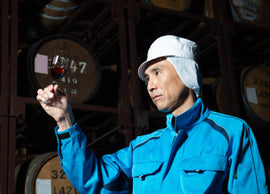Although we will never tire of drinking French rosé, we want to make sure we give other countries a chance to steal the spotlight, so September’s wines come to you from Italy.
The first wine comes from G.D. Vajra in the Piedmont region. The Vajra family has farmed Bricco delle Viole, the highest cru in Comune di Barolo, since the 1880s. At the young age of fifteen, Aldo Vajra embraced the dream to revive his family legacy. Displaying a vision and commitment belying his young age he took over the estate in 1968, turning a new page. Aldo acquired the first organic certification of the region (1971), created private biotype selections (selezioni massali) of Nebbiolo and Dolcetto, pioneered the renaissance of Freisa, a noble yet forgotten local grape (1980) and the cultivation of Rhine Riesling in Piemonte (1985).
Today, the Vajra family continues the vineyard research focusing on the influence of soil and climate change. The winery is trail-blazing the rediscovery of Chiaretto di Nebbiolo and the wines of the 17th century – long before Barolo was created - through two limited-production wines: “N.S. della Neve” (a champagne-method rosé nature) and “Claré JC”, a partial whole-cluster fermentation of pure Nebbiolo. Aldo and Milena, are now joined by their energetic children Giuseppe, Francesca and Isidoro, and by an amazing team of young professionals, in their quest for an authentic expression of their land into the wines. G.D. Vajra is an independent winery, entirely family-owned.
Bertani’s impact on Veneto wine making, particularly in Amarone production, is so considerable that ‘Bertani’ and ‘Amarone’ are nearly synonymous. Their 150+ year history is dotted with groundbreaking initiatives and royal accreditation. While respectful of their past, Bertani strives towards innovation, using progressive techniques and equipment allied with extensive experience and a deeply felt respect for tradition to provide wines of uncompromising quality.
Think Pink!
Carrie Upson- General Manager
|
Bertani Bertarose 2022 |
||
|
Region: Verona, Italy |
About the Winery: Bertani was founded in 1857 by brothers Gaetano and Giovan Battista Bertani. Prosperous wine merchants who believed in quality winemaking held the key to the future, the Bartanis invested in some of the finest vineyards in the province. Recognition and success followed swiftly as Bertani became one of the first Veronese producers to export their wines on a significant scale. Bertani was founded in Grezzana, a province in the Valpantena DOC, north-east of Verona. Here the company headquarters remain, including the estate’s historic vineyards and cellars that are still in use. The Valpantena valley is covered with marble-calcareous soil containing large quantities of iron, which impart unique, spicy mineral flavors in the grapes. The particular characteristics of the soil have allowed the wines to be labeled officially a CRU status within the Valpolicella DOC; the only one among the seven valleys of Valpolicella. About the winemaking: The grapes are grown on the inland hills of Lake Garda and with young Guyot trained Valpolicella vines averaging about 10 years old. The soils are clay-limestone. Harvest occurs at the end of September, and the varieties are vinified separately in stainless steel with controlled skin contact. After blending, the wine rests in stainless steel tanks for three months. 50% Corvina, 30% Molinara, 10% Corvinone, 10% Rondinella Tasting notes: Aromas of berries and spices. The palate balances good structure and vibrant acidity, with a fresh, pleasant finish. Perfect as an aperitif. |
|
|
Director of Operations: Andrea Lonardi |
||
|
Price per bottle/Price per case: $18.99 btls/ $216 case |
||
|
Suggested Food Pairing: This wine is ideal paired with salads, delicate flavored pasta dishes or as an aperitif. |
||
|
G.D. Vajra Rosato “rosa bella” 2022 |
||
|
Region: Piedmont, Italy |
About the Winery: In 1971, Aldo Vajra, then still a university student, was one of the earliest to adopt organic farming in Piemonte. Vineyards have been nurtured, and soil preserved, by grassing and spontaneous cover crop for almost 50 years now. They are sustainable and organic certified. With an incredible ratio of manual work per hectare, farming at Vajra is a labor of love and “recipe-free” attention. Intense research is also placed into monitoring and improving the biodiversity of both flora and fauna not just in the vineyards, but also in the winery fields and forests. About the winemaking: Nebbiolo 85%, Barbera 10%, Dolcetto 5%. Fruit was harvested in a prolonged time window, between August 20th and October 5th of 2022. No malolactic fermentation. Aged a short time in stainless-steel tanks at low temperature, prior to bottling. Tasting notes: Rosabella is a rosé de saignée. The early picking and a gentle maceration express the grape aromatics in a fragrant, translucent style. This is a seasonal, limited production that shows a surprising capacity of evolution. Incredibly ethereal, dominated by the presence of Nebbiolo. The bouquet reveals notes of jasmine, rose petals, white raspberries, pink salt and high mountain flowers. The palate features the signature freshness of Nebbiolo, with an initial lush, salty texture and balanced acidity, an aerial balance and a superb drinkability. |
|
|
Winemakers: Guiseppe, Isidoro, and Francesa Vaira |
||
|
Price per bottle/Price per case: $21.99 btls/ $238 case |
||
|
Suggested Food Pairing: It will be a terrific addition to any BBQ, and it's a tremendous table setter with antipasti when you want to enjoy its more tannic Piedmonte red cousins following with more hearty fare. Then of course, it will be thoroughly enjoyable all by itself on some warm, peaceful sunny day. |
||



